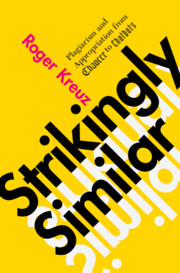
- Coming soon
- Publisher:
- Cambridge University Press
- Expected online publication date:
- January 2026
- Print publication year:
- 2026
- Online ISBN:
- 9781009618335
- Subjects:
- Social Psychology, Sociology: General Interest, Psychology, Sociology

Plagiarism and appropriation are hot topics when they appear in the news. A politician copies a section of a speech, a section of music sounds familiar, the plot of a novel follows the same pattern as an older story, a piece of scientific research is attributed to the wrong researcher… The list is endless. Allegations and convictions of such incidents can easily ruin a career and inspire gossip. People report worrying about unconsciously appropriating someone else's work. But why do people plagiarise? How many claims of unconscious plagiarism are truthful? How is plagiarism detected, and what are the outcomes for the perpetrators and victims? Strikingly Similar uncovers the deeper psychology behind this controversial human behavior, as well as a cultural history that is far wider and more interesting than sensationalised news stories.
‘In this book, Kreuz offers a breezy account of actual, suspected, or accidental plagiarism. Featuring examples drawn from literature, music, and politics, Kreuz gives example after example of plagiarism-and some copyright infringements too-by writers who are famous, infamous, or essentially unknown.’
Dennis Baron - author of You Can't Always Say What You Want
‘An engaging new perspective on the topic of plagiarism. The book is overflowing with stories of real-world instances of plagiarism in professional contexts from academia, politics, and journalism, to the creative arts. These stories inform an insightful analysis of the causes and consequences of plagiarism.’
Guy J. Curtis - editor of Academic Integrity in the Social Sciences
‘Strikingly Similar is an essential resource for those interested in plagiarism. Kreuz has compiled a comprehensive history of a topic critical to writers and academics. This book provides important lessons and cautionary tales from the history of writing for the age of AI.’
David Rettinger - author of Cheating Academic Integrity, and President Emeritus of the International Center for Academic Integrity
 Loading metrics...
Loading metrics...
* Views captured on Cambridge Core between #date#. This data will be updated every 24 hours.
Usage data cannot currently be displayed.
Accessibility compliance for the PDF of this book is currently unknown and may be updated in the future.